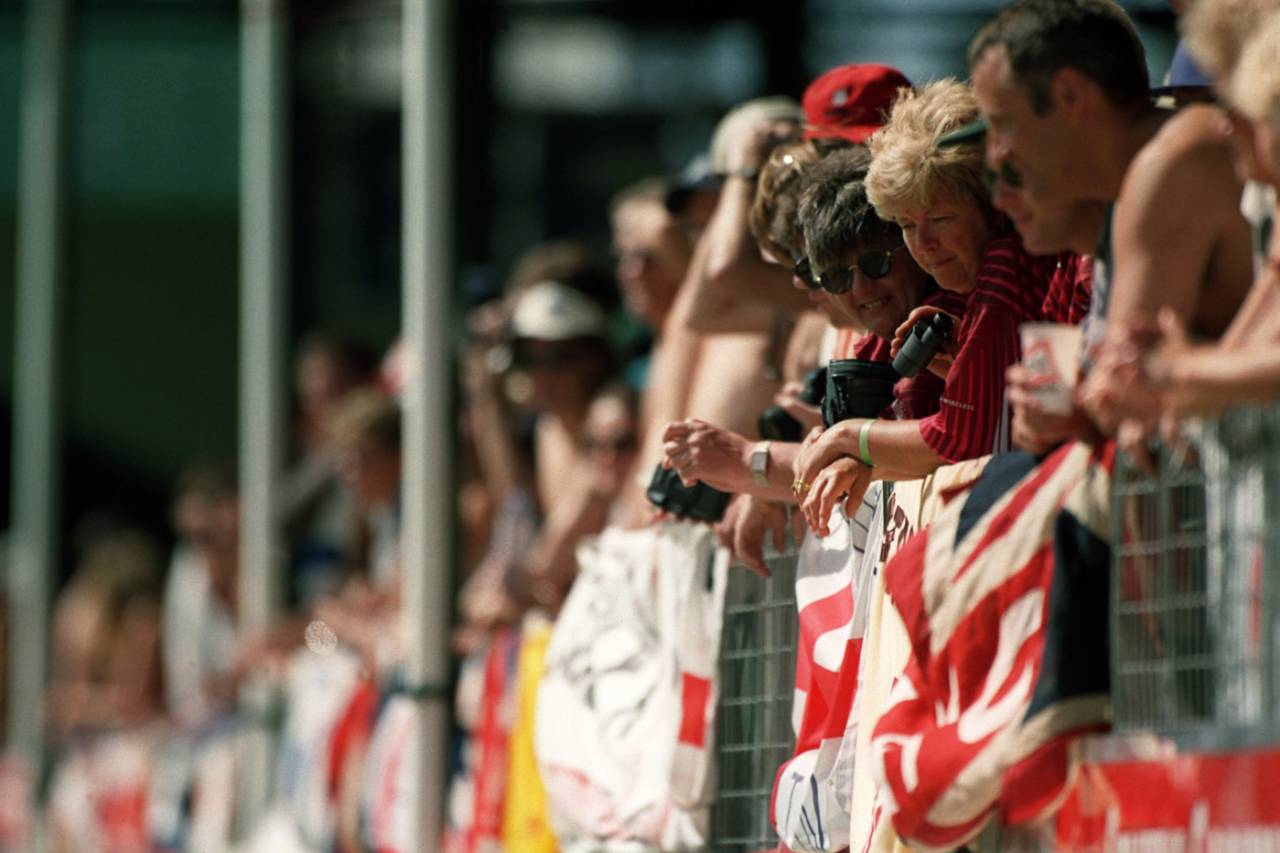Loving English cricket in the '90s
A new memoir speaks to a generation of fans who were also losers
Andrew Miller
30-Apr-2016

You had to be a masochist to be an England fan during the decade of defeats • PA Photos
The 1990s. God, they were a tough decade. It may be fashionable now to fear for cricket's relevance in an age when satellite TV has whisked the sport out of the reach of the majority of Britain's spotty, impressionable teenagers, but at least on the flip side, there's a team out there somewhere that knows, intermittently, how to win.
My generation, on the other hand. Well, we were saddled with losers - "literally, losers", as Emma John's wincingly honest memoir reminds us. And what did that make us by proxy?
In fact, give or take a few undertones of unrequited love (and let's face it, most of us probably exhibited more give than take…), Following On - A Memoir of Teenage Obsession & Terrible Cricket could have been the tale of any thirtysomething England cricket fan of any gender or persuasion.
Every detail of John's own cricketing awakening feels as familiar as the "tick-tick-tick" of the BBC's Test match theme tune, "Soul Limbo". There's that first accidental introduction, in her case during one of her mother's deliberately hoarded ironing sessions, during which the question: "Mum, what is a wicket?" acts as an open-sesame moment into a world of figures in white who had previously appeared to do a whole lot of not a lot, while blotting out the TV schedules for days on end.
There are the invaluable newspaper cuttings of that pre-internet age, lovingly collated in John's case into bedroom posters (proof, in her mother's eyes, of her "industrious" teenage nature, proof to her sister that "she was such a nerd" - take your pick). And then there's page 341 and all that, those sibling Ceefax squabbles that inevitably resulted in being brained by the TV remote (but Emma, did you never discover that double-tapping the button allowed you to overlay the text on the actual picture?)

Bloomsbury
There was no easy way to be an England cricket fan in that desperate, defeat-ridden decade - least of all a trainee one, learning the complexities while at the same time processing the failures. For all the gratification on offer, we might as well have taken up computer coding as a hobby. (And yep, a fair few of us did that too…)
And yet, our generation always knew there was more than just victory and defeat at stake. "If cricket hadn't been so difficult to understand, I might never have bothered with it at all," writes John in the first of several passages that ring utterly true to my own experience of learning cricket's ropes. "You had to work hard for the privilege of understanding what you were watching."
But none of that quite encompasses the depths of masochism that were required to cope with England's serial failures throughout such a formative decade. And so, to aid her own quest for self-discovery (or closure, as it turns out), John enlists the help of the men in the middle themselves.
If there is a weakness in the premise of John's book, it isn't exactly one of her own making. It just so happens that most of the players she idolised are now among the most recognisable voices in the sport. So, while there is situational comedy in several of her encounters with the class of the 1990s, some of the insights on offer are fairly run-of-the-mill - the likes of Alec Stewart, Nasser Hussain and the absolute apple of her teenage eye, Michael Atherton, are simply too experienced in the art of broadcasting to offer much more than sound bites.
That said, John's expertise in player profiling - honed during her years as the Wisden Cricketer's deputy editor - does unearth some gems, not least her fascinating portrait of a hungover Phil Tufnell. As Tuffers consumes one of the best-timed sausage sandwiches ever committed to literature, and swings his way through his full gamut of emotions, it dawns on John why she had always had a soft spot for him.
"He was sulky and moody… he was needy for affection, and desperate to please… he just wanted to have fun; he just wanted to sleep. I didn't need Mike Brearley to diagnose Tufnell, I could do it myself. He was a teenager."
Following On. A Memoir of Teenage Obsession & Terrible Cricket
By Emma John
Bloomsbury
260 pages (hardback)
By Emma John
Bloomsbury
260 pages (hardback)
Andrew Miller is UK editor of ESPNcricinfo. @miller_cricket